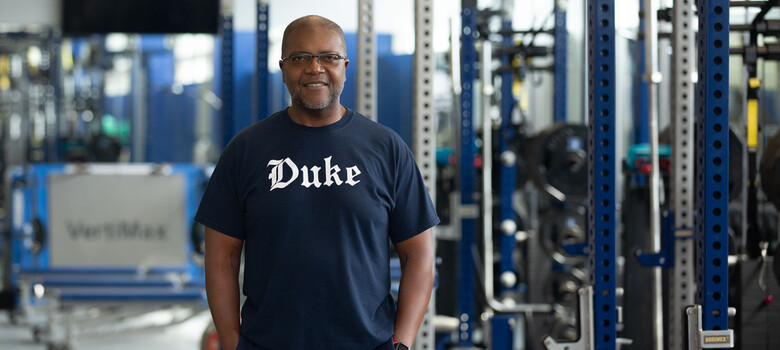On the Move Again After Chronic Total Occlusion
Duke Catheterization Advances Treat Complex Coronary Artery Blockages
Mitchell Doub smiles at the White Cliffs of Dover in England in July 2023.
Mitchell Doub, 64, could barely walk across his living room without experiencing debilitating chest pain thanks to an advanced form of coronary artery disease called chronic total occlusion. After Doub was told nothing could be done, Duke Health’s Islam M. Othman, MD, offered a solution. Dr. Othman performed a complex catheterization procedure that opened Doub’s blocked artery and gave him immediate symptom relief. Now Doub is back to working out and looking forward to an upcoming trip to Colorado. “If you have a chronic total occlusion, don't walk; run to Duke,” he said.
Celebration Brings on Warning Signs
As Mitchell Doub of Winston Salem, NC celebrated an exciting win for Appalachian State University football in 2005, a burning pain in his sternum quickly brought him back to Earth. He soon learned he had a major blockage in one of the arteries that supplied blood to the left side of his heart. Doub underwent percutaneous coronary intervention (PCI), a minimally invasive procedure that involves inserting a catheter into a major artery and through blood vessels to reach a buildup of fatty deposits called plaque that comprise the blockage. Once there, his interventional cardiologist inflated a tiny balloon to compress the plaque and placed a mesh tube called a stent to keep the artery open. Two weeks later, Doub was back on his feet playing basketball with his buddies.
A Life-Threatening Complication
Nearly two decades later, in January 2024, Doub noticed a familiar pain during his workout. “I kept trying to run, and each time I would feel that sternal pain, but it went away if I slowed down to a walk. And I thought, ‘Well, this is not good,’” Doub said.
Before long, Doub was undergoing another PCI procedure to treat a 95% blockage in the same place as before. This time, the blockage was calcified, meaning it was hard like a rock and much more difficult to treat. When his doctor tried to clear the obstruction, Doub’s artery ruptured -- a life-threatening complication. Five days later, Doub had to undergo open heart surgery to bypass his blocked artery.
Here We Go Again
About six weeks into recovery from open heart surgery, Doub started having chest pains again. His new bypass vessel had collapsed, putting him right back where he started. The original obstruction was now a chronic total occlusion (CTO) -- a long-lasting and complete blockage in a coronary artery. Doub’s local doctors told him there was nothing else they could do. His heart bypass surgery had failed, and attempting another PCI procedure was too risky. Instead, Doub would have to hope his heart would adapt by growing more blood vessels on its left side. “I was basically going to be an invalid for the rest of my life or until I built up sufficient collateral vascularization, which could take years,” Doub said.
Hope at Duke
Doub’s daughter made an appointment for him at Duke Health, where he was quickly referred to Dr. Othman. Dr. Othman is among an elite group of “complex high-risk indicated procedure (CHIP) operators” in the U.S. These specialized interventional cardiologists are highly experienced in treating chronic total occlusions with complicated PCI procedures. “You can usually tell when someone is confident and competent,” Doub said. “I saw both traits in Dr. Othman. I felt like if anyone could fix me, it was going to be him.”
For Doub’s procedure, Dr. Othman performed an intravascular lithotripsy, which uses sonic sound waves to break up calcifications. This technology was first designed to treat kidney stones. “In less than 90 minutes, he had me fixed,” Doub said. “Right after he did the procedure, I had no chest pain at all, immediately.” Within weeks, Doub was back to running and working.
Find a Qualified CHIP Operator
If you have a chronic total occlusion and have been told it can’t be treated, Dr. Othman recommends getting a second opinion from a doctor who routinely treats CTOs -- a CHIP operator. “Hopefully more people find out that we're able to help these patients at Duke,” he said.



